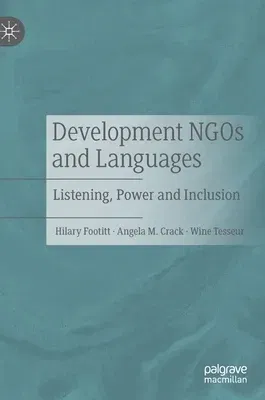Hilary Footitt
(Author)Development Ngos and Languages: Listening, Power and Inclusion (2020)Hardcover - 2020, 13 August 2020

Qty
1
Turbo
Ships in 2 - 3 days
In Stock
Free Delivery
Cash on Delivery
15 Days
Free Returns
Secure Checkout

Print Length
248 pages
Language
English
Publisher
Palgrave MacMillan
Date Published
13 Aug 2020
ISBN-10
3030517756
ISBN-13
9783030517755
Description
Product Details
Book Edition:
2020
Book Format:
Hardcover
Country of Origin:
NL
Date Published:
13 August 2020
Dimensions:
21.01 x
14.81 x
1.6 cm
ISBN-10:
3030517756
ISBN-13:
9783030517755
Language:
English
Location:
Cham
Pages:
248
Publisher:
Weight:
467.2 gm